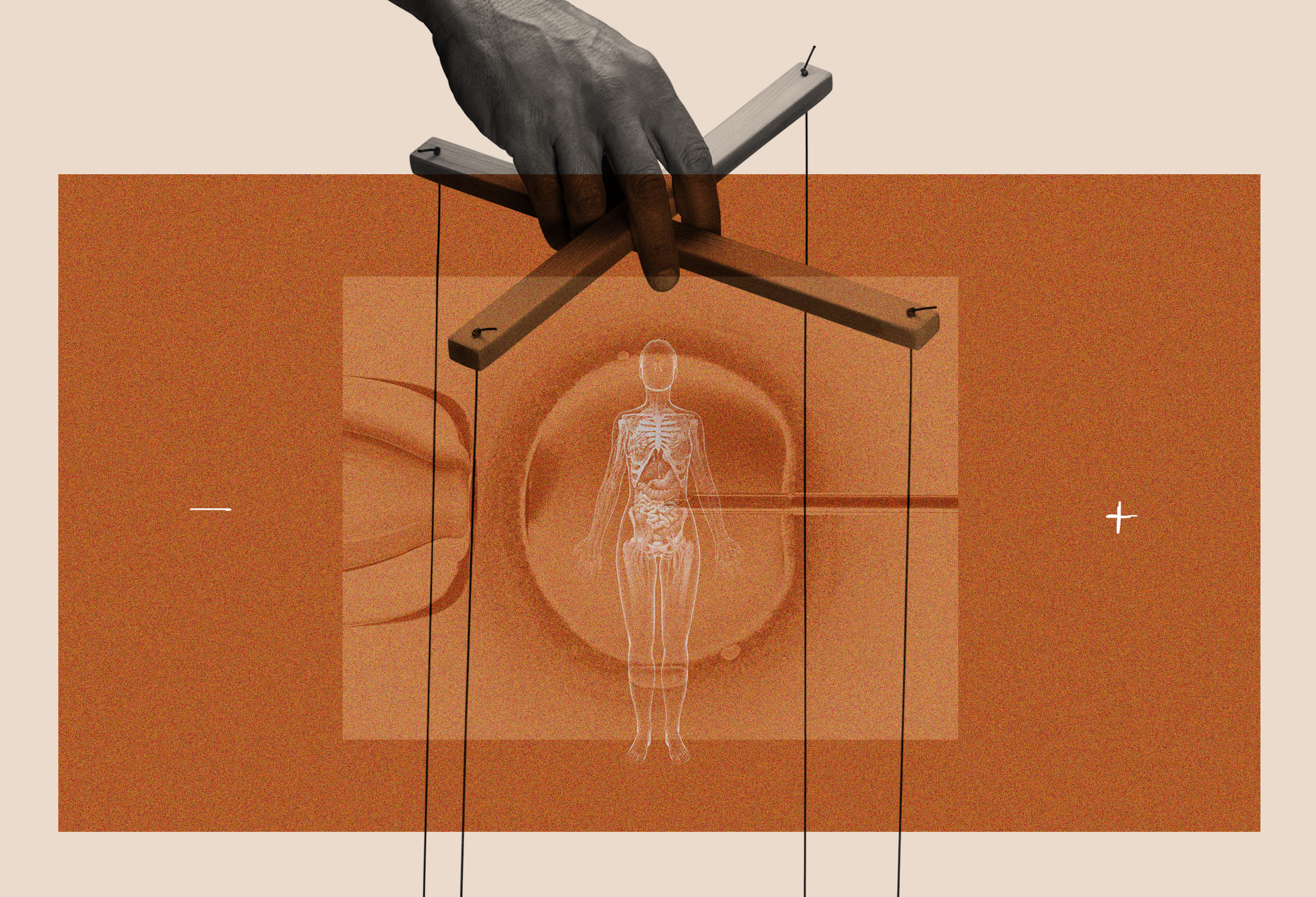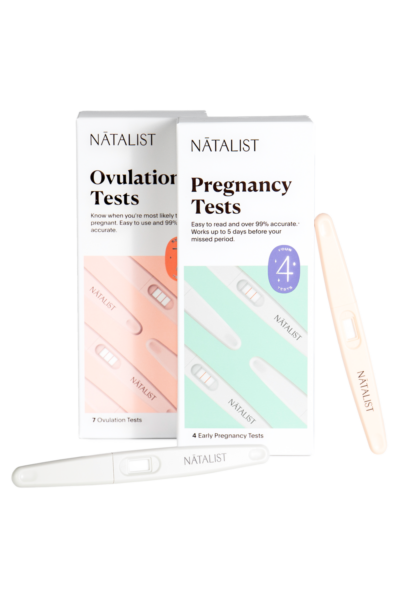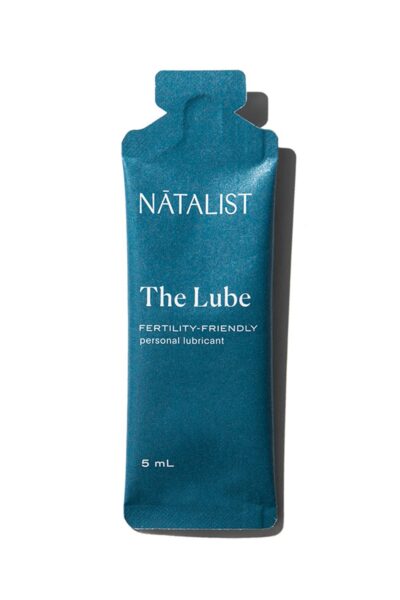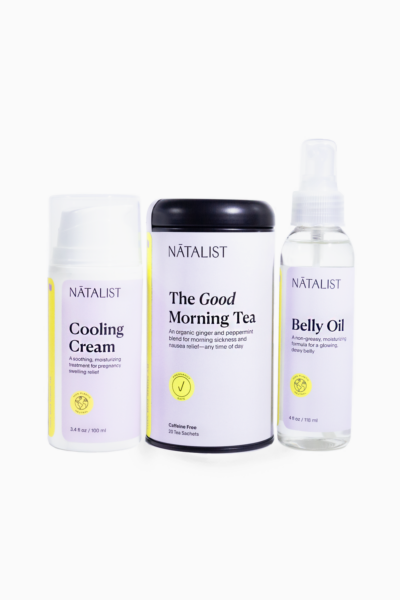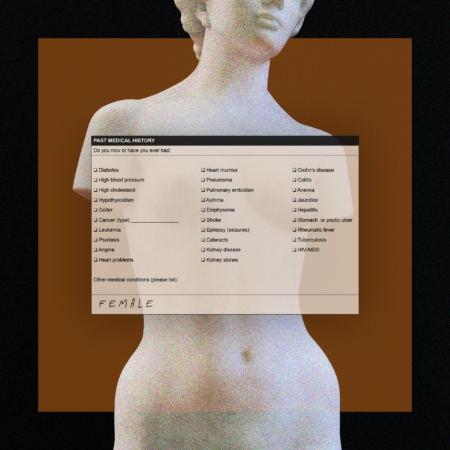Halle Tecco came up with the idea for Natalist years before she had the courage to start the company. After seven years of sifting through vast amounts of information—and misinformation—on her own fertility journey, the women’s healthcare investor was inspired to create a more evidence-based approach to reproductive care.
She launched Natalist in 2019, offering trusted fertility and pregnancy essentials including ovulation predictor kits and pregnancy tests, as the only female-founded brand on the market. (Her seven biggest competitors were all male-owned and led.) “A lot of products available to women are based on no evidence at all; in fact, they have counter-evidence to their utility,” says Tecco, who also hosts The Heart of Healthcare podcast. “It breaks my heart to see these businesses pushing products to women who may be in a somewhat vulnerable time.”
Fast forward four years and of the more than 100 startups-to-watch in the women’s reproductive space, a whopping 70 percent are founded by women. Tecco, a former Professor at Columbia Business School who taught the first MBA-level course on digital health investing, has invested in game changing female-founded companies in the women’s health space, like Aavia, EverlyWell, and KindBody. Here, she opens up about how she’s reimagining women’s healthcare products—and why it’s so important for women to continue to lead the fertility conversation.
First, can you tell us why you wanted to start Natalist?
I have more healthcare knowledge than the average consumer, but I still had a difficult time combing through what I actually needed versus what was junk. That was the inspiration to create a company that could sift through the essentials and offer evidence that’s essential. We want to be able to say, “Here is what you need. Here is what will actually help you on your journey. And here’s what you don’t need.” Women are getting trapped wasting money on a lot of things—I spent thousands of dollars on things that promised to get me pregnant. What we’re lacking right now is a way to decipher what works and what doesn’t work.
I finally got frustrated enough that I started the company. Everyone I talked to, from my friends to my colleagues, said the same thing over and over: that the products available are outdated, there was no company offering ovulation tests, pregnancy tests, and prenatal all together, and none of them were led by women who really understood the problem. We wanted to be a trusted one-stop-shop for women with everything they need, versus going to different aisles at the store to find these products, while simultaneously trying to figure out which ones would “work”.
Shop Natalist on The Helm
For a long time, the fertility industry has been led and run by men, where male founders have been given millions of dollars in funding to create products for women. This has meant that for decades—even centuries—men have controlled the conversation around a woman’s reproductive journey. But in the last few years, there has been a seismic shift in women taking back control of their own reproductive narrative. Why is it so important for women to be at the helm of companies like the Natalist?
For some players in the space, you have no idea who’s running them because the website doesn’t even have an About Page. There’s one specific company—one of the most popular ovulation test sellers on Amazon—which is owned by some random guy listed in Florida. There’s no customer service, there’s no support. It’s this faceless brand that uses pregnancy products as a commodity. That’s who I really feel like we’re up against. We want to build our products with a lot more empathy, and have the customer in mind because we are the customer. Customers email us all the time with photos of their ovulation strips asking if it’s positive or not, and we’re able to help them. That’s something that a faceless brand without customer support can’t do. We are real people and we stand behind our products, that’s why we put our names and reputations out there.
It’s a lot about empathy, it’s a lot about the user experience and really going that next level to support someone and to be there for them, to give them answers that are, a lot of times, emotionally charged. Getting a pregnancy test answer is one of the most life-changing experiences that you can offer. That’s a big responsibility for us. We take that very, very seriously. Other companies—a lot of them founded by men—do it very transactionally.
How do you decide what products the Natalist creates and stands behind?
What we decide not to make is just as important to our company. We’re bypassing the opportunity for more revenue because we believe that, in the long run, building trust and doing the right thing is more important. We have a pretty rigorous process which looks at various elements of a potential product and it heavily involves our medical director and our medical advisors. We really look to them to help us decipher the research and understand that a lot of times, a company will come out and say, “Oh, this study says that this product works.” And you’re like, “All right, but it was a study of 12 people and it was funded by your company. Of course it said it worked.”
We look towards unbiased, large randomized trials —indications that it is a product we can really stand behind and it does what it says it does. That is core to who we are.
What was your experience starting the company and fundraising as a new mom?
When I decided to start Natalist, my son was about a year old. I was getting used to motherhood, teaching at Columbia, and angel investing. I had a really good setup! So when I told my husband, “I can’t get this idea out of my head. I have to do it,” he was like, “Are you sure?” But I knew this needed to exist. I left academia, paused angel investing for a while, and put together an early team. I’m a healthcare person, I’m not a designer. I didn’t know anything about e-commerce. So I assembled the right team and then took it to investors.
View this post on Instagram
My experience fundraising was an anomaly. I had a lot of investors in my network who I had worked with for many, many, many years. I knew exactly who I wanted to work with—I knew I wanted to build a diverse cap table that was made up of mostly parents, people of color, and LGBTQIA+ investors. I wanted diverse paths of parenthood represented, people who could truly empathize with the fertility experience of women and who brought different perspectives. For example, two of our male investors are gay dads who bring a really interesting perspective. They helped connect us to the right people to collaborate with the LGBTQIA+ community, and helped inform our Parent Plan book, with a version for hetero couples and a version for LGBTQIA+ couples.
Our fundraising, in 2018, went relatively fast. We ended up raising a $5 million seed round before it had even incorporated, so it was pretty early for us. We had nothing to share about the company at that point. We launched in the fall of 2019. Today, our tests and prenatal vitamins can be found everywhere from Target to Rite Aid to Whole Foods.
The average woman trying to conceive is someone who has struggled and is trying to understand why. Yet it’s something women don’t often share publicly. Why do you think that is?
We live in this weird world where most women can and will get pregnant naturally, but they’re not going to share their journey until they are pregnant—that’s the nature of fertility. They share an Instagram post that they’re pregnant but you don’t know what their journey was like (whether it took six months or a year), and so it appears as though everybody just gets pregnant. It’s a similar psyche to other things that happen on Instagram where people look flawless but you don’t know they have a makeup artist and use editing tools. You just see the final product and then you feel bad about yourself. The same thing happens in pregnancy where you see someone’s exciting pregnancy announcement but you don’t really know that for most people, it takes a journey to get there.
As the founder of a fertility company, how important is it to be publicly open about your own fertility journey?
I don’t post my son on social media and I don’t talk about certain details of his journey because those are details that I want him to find out through his family and not through the internet. That has been difficult for me because as you said, I’m leading a fertility company; I’m expected to be this spokesperson on fertility. But I also want to protect my family and there’s a level of privacy that my family deserves. I’m constantly put in positions—and there’s never any malintent—but I’m constantly put in positions where I’m asked questions like whether he is genetically related to me, which seem like okay questions to ask to someone who runs a fertility company, but I don’t want to be an open book. This is a very private thing, this is my son’s story in a lot of ways, and not mine to put out there on the internet.
A lot of products available to women are based on no evidence at all; in fact, they have counter-evidence to their utility.
At the end of the day, though, I’m seeing a shift in people opening up about their path to parenthood. Influencers, celebrities, and people in general are starting to talk about their different paths: IVF, adoption, egg donors, sperm donors, IUIs. There’s so many different ways to become a parent, and people are starting to open up—even if it’s to say, “Hey, it took six months but those six months felt like 10 years”—and that’s a really good thing. For example, I had no idea what a very close girlfriend of mine went through to have her two children. She was a little bit older when she had her kids and I was like, “Dang, she made it look so easy.” But once I started telling her my story, she came out with her story, and she said, “Yeah, even my family doesn’t know because they’re a little bit more traditional and would place judgment on me.” It’s insane that these things are judged in any way.
Do you have any advice for other founders and CEOs who want to support their employees on their fertility journey?
Creating policies around paid time off if you’re going through IVF treatment or have had miscarriage should be no questions asked. It’s about embedding it in policy for folks who have roadblocks. On my team, we all know exactly who is trying right now. We have paid time off for miscarriage and pregnancy loss. I have had seven miscarriages since starting Natalist. Others on our team have gone through IVF and IUI. It’s a conversation that we’ve normalized internally, and obviously that’s unique at a workplace. I’ve also had employees tell us when they’re doing their IVF transfer, so two weeks later we knew that they would be getting a positive or negative result and they shared that. Other employees don’t want to say something until a little bit later, to protect themselves. I’ve stopped telling people when I have a positive pregnancy test because I have recurrent miscarriages and I’m tired of having to talk about it. It comes down to the CEO: do you have a leader who will take the lead in discussing it because, although everybody should have the option to keep that private—it’s not something you should feel obligated to share—you should be able to share without worrying about how you’ll be perceived by your colleagues or boss.
Some employers also actually offer subsidies on Natalist products. Employers will reach out and say, “We want to support family planning and we want to show and invest in this milestone for our employees so that they know we truly care about them and want to support their fertility goals.” We have one employer who pays for half the cost of anything that an employee buys from Natalist. We have others that offer 20 percent off, which is still generous.
Why is it important for you, as an investor, to invest in women-founded health companies? And what are you most excited about in the women’s health space?
Women have been underfunded and underrepresented in healthcare leadership for too long. And women’s health as a category has been underfunded, since many investors think of the space as too “niche” (ha!). I see an opportunity to move the needle for everyone—both women founders and the customers who have been left behind. There are a growing number of companies using their brand to normalize taboo topics like miscarriage, STIs, infertility, constipation, sex, postpartum depression, and more. Which is a win for us all!
Lastly, for the uninitiated, how would you recommend customers use Natalist products? Or what are some products you’re particularly proud of?
Our products are all FDA cleared, but rather than look like medical products, we added a layer of making them really delightful and beautiful—more similar to the beauty products that you have in your bathroom. Most of our customers get pregnant within four to six months, and generally, women start using our ovulation predictor kits starting at month two of trying to conceive. If they have a regular cycle, then they get their rhythm after a few months and don’t need to test anymore. But most women don’t have a regular cycle, so for me, I check my ovulation every single month.
For our prenatal vitamins, we use the natural form of folate rather than folic acid, which is the synthetic form. People with a certain gene [MTHFR] can’t process the synthetic form. Folate is more expensive which is why most companies use folic acid. But for prenatal vitamins and for women who do have that gene, folate is especially important. In order to understand if a prenatal meets the criteria, it takes a lot of work—you’re looking at 20-some ingredients in the prenatal and comparing it to an American College of Obstetricians and Gynecologists list of recommended dietary intakes. When we built our prenatal, we wanted to make sure that we were better than any others in the industry.
